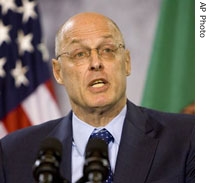VOA慢速英语 2008 0404a
搜索关注在线英语听力室公众号:tingroom,领取免费英语资料大礼包。
(单词翻译)
This is the VOA Special English Economics Report. |
| Treasury1 Secretary Henry Paulson announces the proposal on March 31, 2008 |
This week, the Bush administration proposed major changes to the way the financial system is supervised. Treasury Secretary Henry Paulson announced the plan Monday. He said the changes should not and will not be put in place until the current financial crisis is over. The plan is divided into short-term, intermediate-term and long-term goals.
Among the short-term goals is an expansion of the President's Working Group on Financial Markets. The proposal would bring banking2 supervisors3 into the group and expand its responsibility to the entire financial industry. Other short-term goals include creating a group to set rules for the home loan industry. Many people blame irresponsible lending to people with risky4 credit histories for the current subprime mortgage crisis.
Intermediate goals include combining or closing some financial supervising agencies that perform similar duties. The proposal would close the Office of Thrift5 Supervision6, which oversees7 non-bank savings8 organizations. It would also combine the Commodity Futures9 Trading Commission and the Securities and Exchange Commission. The C.F.T.C. currently supervises the market for financial contracts known as futures while the S.E.C. regulates securities markets.
Another aim would be to take the first steps toward the federal government supervising the insurance industry. This industry has been supervised mainly by the states for about one hundred thirty-five years.
In the long term, the plan calls for strengthening the Central Bank to guard against all threats to the financial system. But, the proposal would also create new agencies. It calls for a Prudential Financial Regulator, which would combine all federal bank regulators into a single agency. Also, a Conduct of Business Regulator would be responsible for investor10 protection. This agency would perform many duties currently done by the Securities and Exchange Commission.
Small banks and some state officials strongly oppose the plan. Small banks see the plan as a way to make big financial companies more competitive. Other groups have criticized the plan because it does not provide help for the current mortgage crisis.
And that's the VOA Special English Economics Report, written by Mario Ritter. Transcripts11 and archives are at voaspecialenglish.com. I'm Steve Ember.
 收听单词发音
收听单词发音 




